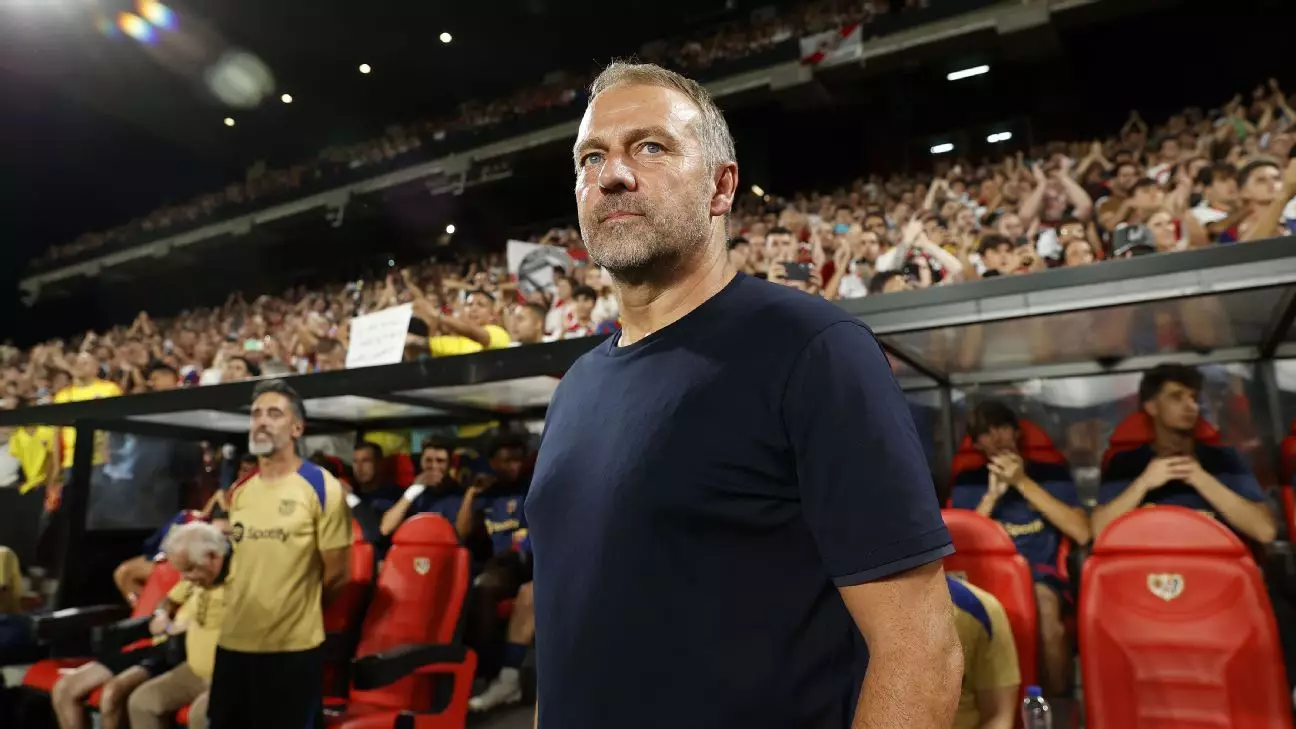Barcelona is in the midst of a troubling phase in LaLiga, marked by a lack of cohesion within the team, as evident from their recent 2-1 defeat to Las Palmas. Coach Hansi Flick, who was brought in to restore the club’s fortunes, now finds himself grappling with diminishing returns on the pitch. This loss not only ended their hopeful celebration of the club’s 125th anniversary but also extended their winless streak to three league matches. With key players like Raphinha finding the net, it is disheartening that the overall team effort fell short against Las Palmas, particularly during crucial moments when defensive lapses resulted in conceding easy goals.
Flick’s assertion that there is a disconnect between defense and attack is a telling observation. The situation seems to stem from a combination of individual errors and a collective lack of understanding on the field. For instance, Sandro Ramirez and Fabio Silva, both of Las Palmas, exploited defensive gaps that Barcelona left wide open. This recurring pattern highlights a fundamental issue in Flick’s tactics: players are not seamlessly transitioning between offensive and defensive roles, leading to missed opportunities and susceptibility at the back. The importance of maintaining a strong connection between these units cannot be understated; teams that fail to synchronize their strategies often find themselves vulnerable.
Although Hansi Flick emphasizes his belief in the players and their innate quality, a persistent theme emerges: belief alone cannot create results. Underlining his thoughts during a press conference, Flick stated, “When you play as a team… and everyone defends well… we can play and win against every team.” This sentiment is valid but stands in stark contrast to recent performances. Following a lackluster draw with Celta Vigo and a defeat by Real Sociedad, fans and analysts are beginning to question whether Flick’s optimism is misplaced. The team previously found success through strong cooperative play, but the recent form suggests that they have diverged from those principles.
Despite overwhelming possession and numerous shots on goal (27 attempts against Las Palmas), Barcelona’s inability to convert chances bears heavy on the psyche of the squad. Flick lamented the lack of efficiency, stating, “I missed that [efficiency] in front of goal to score the goals.” This efficiency issue is symptomatic of a larger problem: a juxtaposition between the ability to create scoring chances and the capacity to capitalize on them. For a team with such offensive talent, a failure to finish matches on a high note can severely dent their morale and instigate doubt amongst players.
Moving forward, the upcoming fixtures against Mallorca, Real Betis, and Borussia Dortmund serve as crucial opportunities for Barcelona to reclaim their form. However, the pressure is mounting, and the prospect of being displaced from the top of the LaLiga table by Real Madrid looms large. Flick’s ability to foster a strong sense of unity during training and instill pre-match confidence will be critical. Furthermore, individual player recovery, such as the return of Dani Olmo, Marc Casadó, and Lamine Yamal, could provide the necessary depth and spark that the squad currently lacks.
The current state of Barcelona presents an urgent call for introspection and tactical recalibration. Confidence should not merely be a talking point; it needs to manifest in robust, connected performances on the pitch. As the team heads into a demanding schedule, the need for a firm strategical reassessment and adjustments in gameplay will be vital for restoring the club’s competitive edge. If Hansi Flick can address these issues effectively, Barcelona’s season may yet pivot toward a more positive trajectory, avoiding the pitfalls that have recently clouded their reputation.

